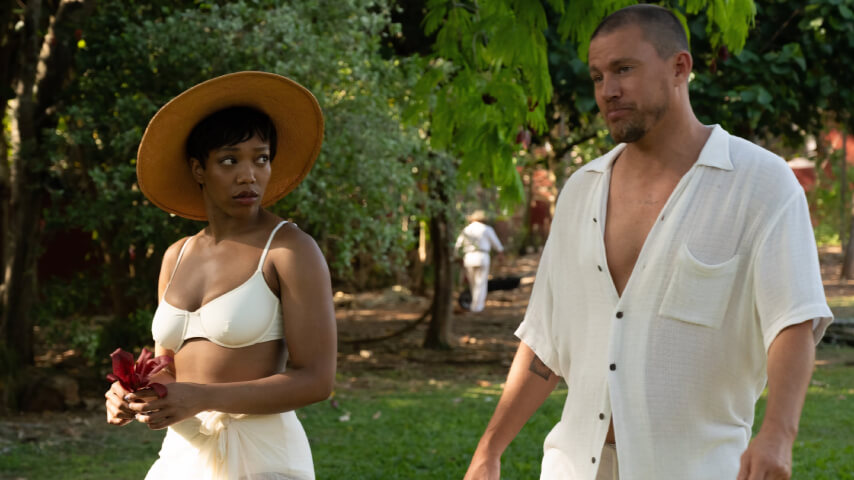Zoë Kravitz shows off her cinephile chops with familiar, entertaining social thriller Blink Twice
Zoë Kravitz's directorial debut pulls from plenty of better movies, but it has original ambitions and lots of promise.
Photo: Amazon MGM
It can be a misstep when certain tiers of the elite attempt to solve class dynamics in their art—such as when a director who descends from the British elite makes a satire about a poor person overtaking his rich friend’s family castle. It never bodes well when a child of not just wealth but also Hollywood birthright wants to attempt to unlock the interwoven layers of inequality and privilege, venturing to solve the puzzle themselves. Blink Twice, the directorial debut of Zoë Kravitz, daughter of Lenny Kravitz and Lisa Bonet though now quite famous in her own right, initially professes those uncomfortable shades of Riches v. Poors: What Does It All Mean? And while there is some mostly unremarked upon tensions between the social standings—a billionaire playboy and his friends, and the vulnerable working-class women they ensnare—I was not not impressed at how Kravitz intelligently avoids tackling the money problem, and instead sets her sights on the gender problem.
The results don’t reinvent the wheel, but Kravitz’s entertaining debut in the director’s chair, not overly ambitious but still commendable, proves that Kravitz isn’t just an avid cinephile: she has the skills to make something herself. Still, she’s burdened by the impulse to make a movie “about something,” co-writing a familiar-feeling script with E.T. Feigenbaum. Maybe that’s Kravitz’s voracious appetite for films coming through—the plot is an amalgam of at least five different movies (off the top of my head, The Most Dangerous Game and Groundhog Day come through). But Blink Twice nevertheless manages to be surprising without overextending its grasp like so many big-brained puzzle-box movies are wont to do.
Kravitz casts her fiancée Channing Tatum as the formerly embattled billionaire CEO Slater King, whose vague “abuses of power” at his company forced him to take a step back from the title and the limelight. Now, he’s returned and atoned, signing checks for charity and spending quality quiet time on his personal private island. He meets Frida (Naomi Ackie) at a gala event she’s working as a cocktail waitress alongside her roommate and best friend, Jess (Alia Shawkat).
Frida has a strange, inexplicable fixation on the wealthy, “canceled” man. I don’t know a single woman my age who thirsts after billionaires, but it’s much more easily rationalized with an actor who looks like Tatum playing the role, instead of a socially inept goblin with a Napoleon complex. Still, Frida seems a little too self-aware to fall for Slater’s act; she lashes out at Jess for giving her ex-boyfriend another shot. A woman of contradictions or merely an ill-conceived character? Hard to say. But Tatum is stellar at selling Slater’s snake oil, and who wouldn’t instantly melt if a guy who looked like Channing Tatum flashed them a smile?








![HBO teases new Euphoria, Larry David, and much more in 2026 sizzle reel [Updated]](https://img.pastemagazine.com/wp-content/avuploads/2025/12/12100344/MixCollage-12-Dec-2025-09-56-AM-9137.jpg)































